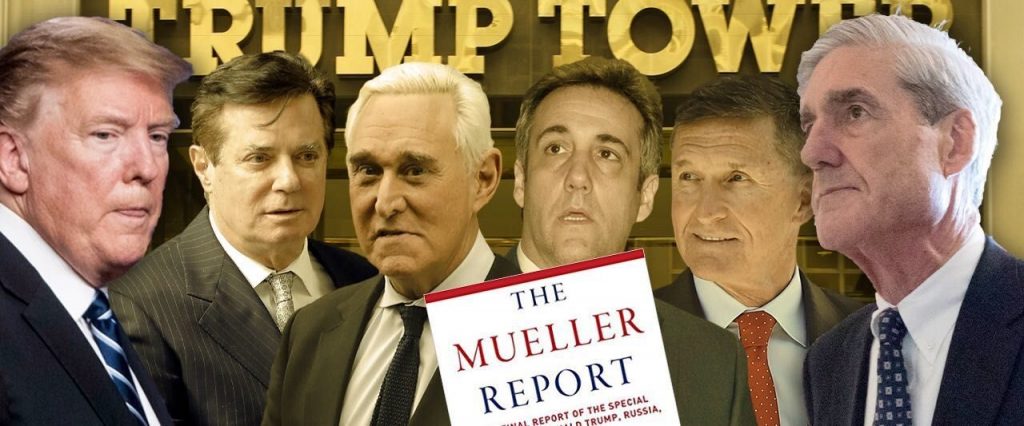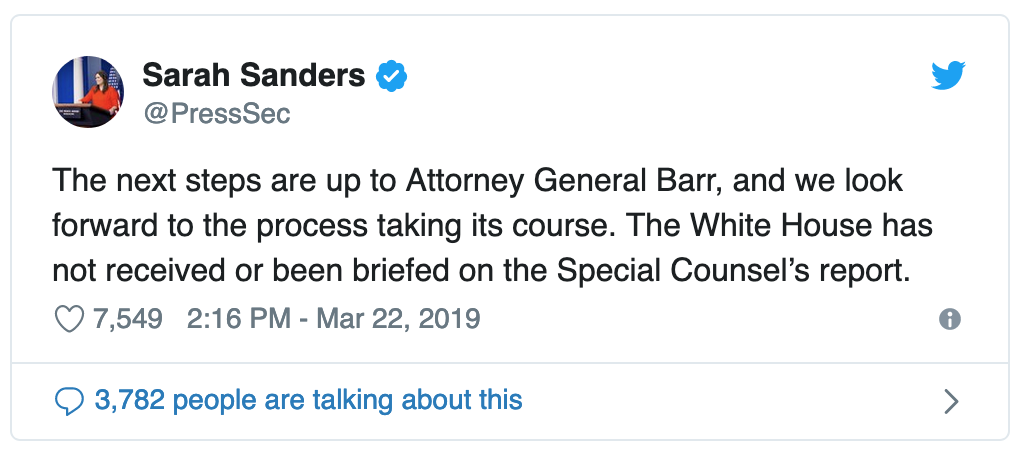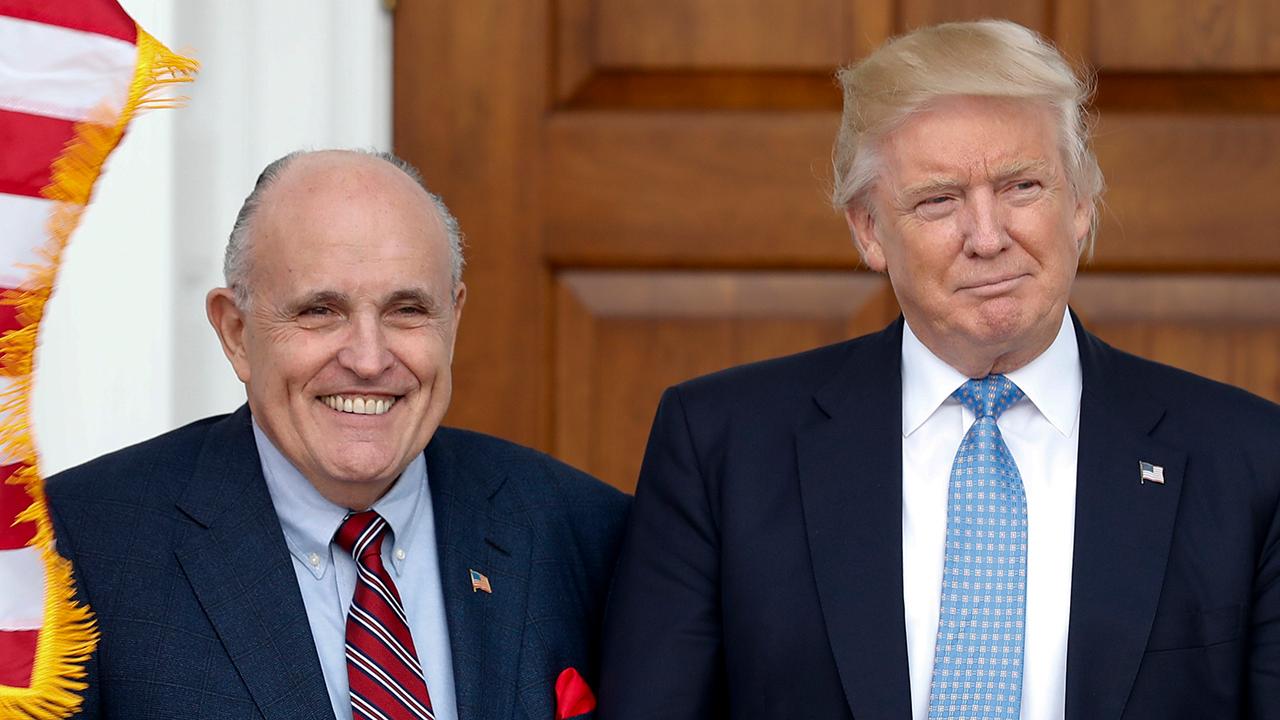Mueller submits long-awaited Russia probe report to Justice Department

Special Counsel Robert Mueller has submitted to Attorney General Bill Barr his long-awaited report on the investigation into Russian meddling in the 2016 presidential race and possible collusion with Trump associates — marking the end of the politically explosive probe and the beginning of a new battle over its contents and implications.
Mueller is “not recommending any further indictments,” a senior DOJ official told Fox News.
The report was delivered Friday afternoon to the Deputy Attorney General Rod Rosenstein’s office and it was delivered to Barr’s office within minutes, a senior DOJ official told Fox News. The White House was notified that the DOJ had received the report around 4:45 p.m., before lawmakers on Capitol Hill were informed. Neither the White House or Congress have seen the actual report.
Both Barr and Rosenstein have seen the report, according to a senior DOJ official.
White House Press Secretary Sarah Sanders tweeted following the report’s submission.
“The next steps are up to Attorney General Barr, and we look forward to the process taking its course,” she said. “The White House has not received or been briefed on the Special Counsel’s report.”

Rudy Giuliani and Jay Sekulow, both of whom are counselors to Trump, also released a joint statement.
“We’re pleased that the Office of Special Counsel has delivered its report to the attorney general pursuant to the regulations,” the statement said. “Attorney General Barr will determine the appropriate next steps.”
Following word that Mueller was not recommending more indictments, Giuliani told Fox News that they were “confident” the investigation would show there was no collusion.
“This marks the end of the investigation. We await a disclosure of the facts. We are confident that there is no finding of collusion by the President and this underscores what the President has been saying from the beginning – that he did nothing wrong.”

Video
Several lawmakers, including Sens. Lindsey Graham, R-S.C. and Dianne Feinstein, D-Calif., received a letter about the report’s submisision. Graham is the chairman of the Senate Judiciary Committee. Feinstein is the ranking member.
“Special Counsel Robert S. Mueller III has concluded his investigation of the Russian interference in the 2016 election and related matters,” the letter said.
Barr also said that he “may be in a position to advise you of the Special Counsel’s principal conclusions as soon as this weekend.”
“Separately, I intend to consult with Deputy Attorney General Rod Rosenstein and Special Counsel Mueller to determine what other information from the report can be released to Congress and the public consistent with law, including the Special Counsel regulations, and the Department’s long-standing practices and policies,” it continued.
House Speaker Nancy Pelosi, D-Calif., and Senate Minority Leader Chuck Schumer, D-N.Y., released a joint statement, urging that the report’s contents be made public.
“Now that Special Counsel Mueller has submitted his report to the Attorney General, it is imperative for Mr. Barr to make the full report public and provide its underlying documentation and findings to Congress,” the statement said. “Attorney General Barr must not give President Trump, his lawyers or his staff any ‘sneak preview’ of Special Counsel Mueller’s findings or evidence, and the White House must not be allowed to interfere in decisions about what parts of those findings or evidence are made public.”
“The Special Counsel’s investigation focused on questions that go to the integrity of our democracy itself: whether foreign powers corruptly interfered in our elections, and whether unlawful means were used to hinder that investigation,” the statement continued. “The American people have a right to the truth. The watchword is transparency.”
It’s not clear how much, if any, of the report will be made public or provided to Congress. None of Mueller’s findings were immediately released.
The president has repeatedly decried Mueller’s probe as a “witch hunt,” emphatically denying he or his campaign colluded with Russia to undermine Democrat Hillary Clinton’s chances in the 2016 race. The president has alleged a slew of internal “conflicts of interest” from Mueller’s team and has previously said his legal team is drafting a “major counter report” in response to its findings.
Mueller’s investigation, which was initially ordered to look into the 2016 election in May of 2017, has gone on for almost two years. It has expanded to probe financial crimes of Trump associates before the election, conversations Trump’s national security adviser had with the Russians during the transition and whether Trump obstructed justice with his comments and actions related to the probe.
Mueller, the former director of the FBI under Presidents George W. Bush and Barack Obama, was appointed special counsel by Deputy Attorney General Rod Rosenstein in May of 2017. In his order, Rosenstein directed Mueller to investigate any links or coordination between the Russian government and individuals associated with the Trump campaign, as well any other matters that arose from the investigation.
“If the Special Counsel believes it is necessary and appropriate, the Special Counsel is authorized to prosecute federal crimes arising from the investigation of these matters,” Rosenstein wrote to Mueller.
Since then, Mueller’s team has indicted, convicted, or won guilty pleas from 34 people and three companies as part of an investigation that has also probed issues unrelated to the 2016 campaign.
Twenty six Russian nationals and three Russian companies have been charged with interfering in the 2016 presidential election.
But none of the Trump associates connected to Trump have been charged with crimes related to collusion, though Mueller’s team charged former Trump associate Roger Stone in January with lying about his communications with WikiLeaks, which published hacked Democratic emails during the election.
Other convictions include: former national security adviser Michael Flynn and former campaign adviser George Papadopoulos, who both pleaded guilty to making false statements in 2017.
Former campaign adviser Rick Gates in 2018 pleaded guilty and former campaign chairman Paul Manafort was convicted and later pleaded guilty in a separate financial crimes case dating back before the 2016 election.
Former Trump lawyer Michael Cohen pleaded guilty to making false statements in a case brought by Mueller in November.
Alex van der Zwaan, a London-based lawyer, pleaded guilty to making false statements this year, and Richard Pinedo, a California man, pleaded guilty to identity fraud in 2018.
Mueller has also looked at actions taken by Trump after he was sworn in as president, like his firing of FBI director James Comey and his ousting of Attorney General Jeff Sessions.
Sessions, once one of President Trump’s most loyal and trusted advisers infuriated Trump over his recusal from the Russia investigation. In March 2017, Sessions announced his plans to recuse himself after reports surfaced detailing undisclosed conversations with Russian ambassador Sergey Kislyak during the campaign.
At the time of his recusal, Sessions said he met with the “relevant senior career department officials” to discuss the issue.
“Having concluded those meetings today, I have decided to recuse myself from any existing or future investigations of any matters related in any way to the campaigns for president of the United States,” Sessions said.
Rosenstein, Sessions’ number two at the Justice Department, then took control of the investigation and decided to appoint Mueller to take over the probe.
Rosenstein said at the time, “What I have determined is that based upon the unique circumstances the public interest requires me to place this investigation under the authority of a person who exercises a degree of independence from the normal chain of command.”
Mueller said in a statement, upon his appointment: “I accept this responsibility and will discharge it to the best of my ability.’’
Rosenstein later ceded oversight to then-acting Attorney General Matthew Whitaker when he took over for Sessions. But the report was submitted to Barr, who was confirmed in February by the Senate as attorney general.
This is a developing story. Please check back for updates.
Fox News’ Jake Gibson and John Roberts contributed to this report.
Tired of Facebook? Check out Conservative-friendly social media. Join FREE today: PlanetUS
Watch this 30 sec. video about PlanetUS:


Leave a Reply